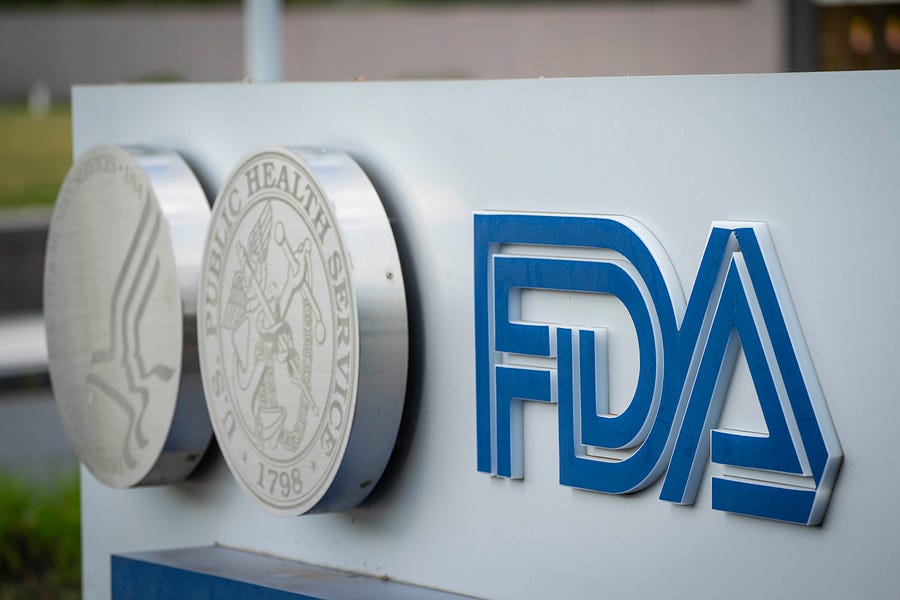FDA regulators are wasting precious time in greenlighting a COVID vaccine as more than 2,000 Americans are dying each day and the pandemic continues to starve American society.
Pfizer submitted data detailing the safety and effectiveness of its vaccine on Nov. 22. But rather than immediately convening experts, the FDA scheduled a review meeting on Dec. 10, almost three weeks later. As Pfizer’s application sits on the shelf at the FDA awaiting authorization, about 27,000 Americans will have died. So what is the FDA doing for three weeks?
As a Johns Hopkins scientist who has conducted more than 100 clinical studies and reviewed thousands more from the scientific community at large, I can assure you that the agency’s review can be done within 24 to 48 hours without cutting any corners. They just need to work harder.
Contrary to popular belief, the FDA process is not hands-on—it does not interview vaccine trial patients or look under a microscope at the immune cells. It’s doing a statistical analysis and looking at data. For the vaccine trial, the data set is small and straightforward. If my research team, normally tasked with analyzing data on millions of patients, was asked to review the smaller Pfizer vaccine study of 43,000 patients, it would take about one hour.
The FDA also reviews manufacturing data from Pfizer on how they made the drug. But not only can that data be reviewed in a few hours, it should have been done months ago when it was available. While the FDA was waiting for Pfizer’s long-term vaccine results to come in, the agency should have anticipated this step and done it early.
The final step of the FDA review is to look at the outcomes of the study volunteers, including rates and severity of infection and side effects in the vaccine and placebo groups. Again, there is no plausible reason why this basic analysis cannot be done in 24 hours. The FDA and external scientists have a simple task: confirm or reject the review already conducted by the trial’s independent data safety monitoring board before FDA submission.
Let me be clear: The agency should not cut any corners in its review process, just cut out the sitting-around time. FDA insiders say the agency and its approximately 17,000 employees were dark for the four-day Thanksgiving holiday, including those working on the vaccine approval. It’s time the FDA adopts a sense of urgency. We’ve had Operation Warp Speed in developing vaccines but Operation Turtle Speed in reviewing the results.
The European Medications Agency uses rolling reviews, evaluating data as it becomes available for the sake of efficiency. The FDA does not conduct real-time reviews. This is a good time to start.
Pfizer’s vaccine is now approved for use in the U.K. Americans have a right to ask why an American vaccine has been approved by the British but not by Americans. Some sympathetic to the FDA career staff have suggested that the U.K. was careless in approving the vaccine quickly, but the real story is how the American government bureaucracy wasted time.
Back in January, The Dispatch reported on the shocking story of how FDA regulators told University of Washington physician Dr. Alex Greninger that he could not test suspected COVID patients in Washington state, requiring him to first apply for an FDA authorization to do so. The complicated application Greninger completed sat at the FDA until he inquired about the delay. He was told that his electronically submitted application was incomplete because he had to also print it out and mail a physical copy along with a CD-ROM or hard drive of the electronic application. You can’t make this stuff up. To add insult to injury, on February 3, the FDA held a daylong conference, scheduled well before the outbreak, on how to navigate the FDA bureaucracy to get a COVID test approved. Reuters reported that “the meeting conveyed little sense of urgency about the epidemic sweeping the globe.” Maybe that lack of alacrity is one reason why it often takes more than a decade for a new diagnostic test or new medication to get FDA approval. It’s like the medical community is supposed to run a race while wearing ankle weights.
People have asked me if we learned lessons from the current pandemic to better address future pandemics. I remind them that we haven’t even taken lessons from the spring, just months ago. FDA delays cost tens of thousands of Americans their lives back in January, and it’s happening again now.
The FDA career staff also delayed the vaccine by adding an unprecedented requirement to slow down Phase III trials. Four weeks before the Nov. 3 presidential election, the FDA increased the median follow-up period requirement for vaccine patients, ensuring that it would be impossible for the vaccine to be approved before the election. The move was a departure from a decades-old standard operating procedure at the agency and the process used to authorize convalescent plasma just months ago.
Even without the new requirement, the FDA would have had follow-up data from tens of thousands of volunteers who had been followed for months. If the FDA would have accepted safety data from the early group of summer vaccine recipients, we might have a vaccine in the public domain by now. Naturally, the FDA staff at the Center for Biologics Evaluation and Research justified its novel requirement by using an old argument—increasing safety standards. That makes it hard for anyone to contest the new requirement without appearing cavalier. But what’s cavalier is delaying a safe and effective vaccine as thousands of Americans die each day.
The FDA’s surprise October decision to require more follow-up data for vaccine trials than they do for other drugs conflicts with the FDA’s regular process. The purpose of Phase I and II trials is to establish safety ahead of a Phase III trial, which is exactly the process that was followed. Phase I and II trials are conducted carefully and intensely monitor all volunteers with a regular panel of blood tests and other biophysical testing before giving the drug to tens of thousands of people in a Phase III trial. Leading scientists from around the world reviewed the Phase I, II, and III results and recommended proceeding on the road to authorization. This system has been working for decades. Politics is not a good reason to change it.
The abundance of vaccine news that came out right after the election was all great news. Two different vaccine regimens were found to be 90 percent to 95 percent effective in preventing the infection (and a third may be close to that in terms of efficacy), but it’s important to remember that they have been 100 percent effective in preventing serious cases of COVID-19. And to date, no one vaccinated has died of COVID-19 based on all available public data.
Some may argue that the current administration has been trying to rush a vaccine to market, so it’s implausible that the White House’s own FDA could be slowing things down. But political appointees at the FDA and the Department of Health and Human Services describe being shut out of the key decisions regarding the vaccine review processes. During this time, the FDA director was vacationing for a week in the Outer Banks of North Carolina, which was later clarified to be a self-quarantine while the director was working remotely. But in fairness to the director, he and his staff have almost no power over the FDA career staff. Appointees say that career staff at the FDA have not been transparent about what they are doing or why they are working at a snail’s pace. Moreover, this lack of transparency and sudden movement of vaccine goal posts just before Election Day demonstrates how the FDA career staff undermined the Trump administration and politicized science, slowing down the vaccine availability to everyday Americans.
A message to the FDA career staff: We are in a war. And right now it’s ugly. We’re losing doctors, nurses, and first responders as thousands of Americans perish daily. As the FDA career staff ponder the safety of known transient side effects like fatigue, they should consider the thousands of Americans dying each day they sit on the application. They should also remember that critical hospital staff are strained. Yesterday, the U.S. hit a record 100,000 Covid hospitalizations, which means other patients are not receiving important medical care.
Today, as the career FDA staff sit on the Pfizer and Moderna vaccine applications, we health care workers continue to work in highly infected ICUs and testing centers. Vulnerable seniors grow lonelier, and more American families fall behind financially. During a health emergency, the FDA should be convening a single, day-long meeting immediately when the data is submitted, in the same way American businesses have emergency board meetings when a crisis occurs. The FDA has a moral and civil obligation to review the data with a sense of urgency. It’s not too late—the FDA could call an emergency meeting today.
Marty Makary M.D., M.P.H. is a professor at the Johns Hopkins University School of Medicine and Johns Hopkins Bloomberg School of Public Health. He is editor-in-chief of Medpage Today and the author of the 2020 Business Book of the Year, The Price We Pay. His opinions are his own and do not represent those of any institution.
Photo by Sarah Silbiger/Getty Images.






Please note that we at The Dispatch hold ourselves, our work, and our commenters to a higher standard than other places on the internet. We welcome comments that foster genuine debate or discussion—including comments critical of us or our work—but responses that include ad hominem attacks on fellow Dispatch members or are intended to stoke fear and anger may be moderated.
With your membership, you only have the ability to comment on The Morning Dispatch articles. Consider upgrading to join the conversation everywhere.